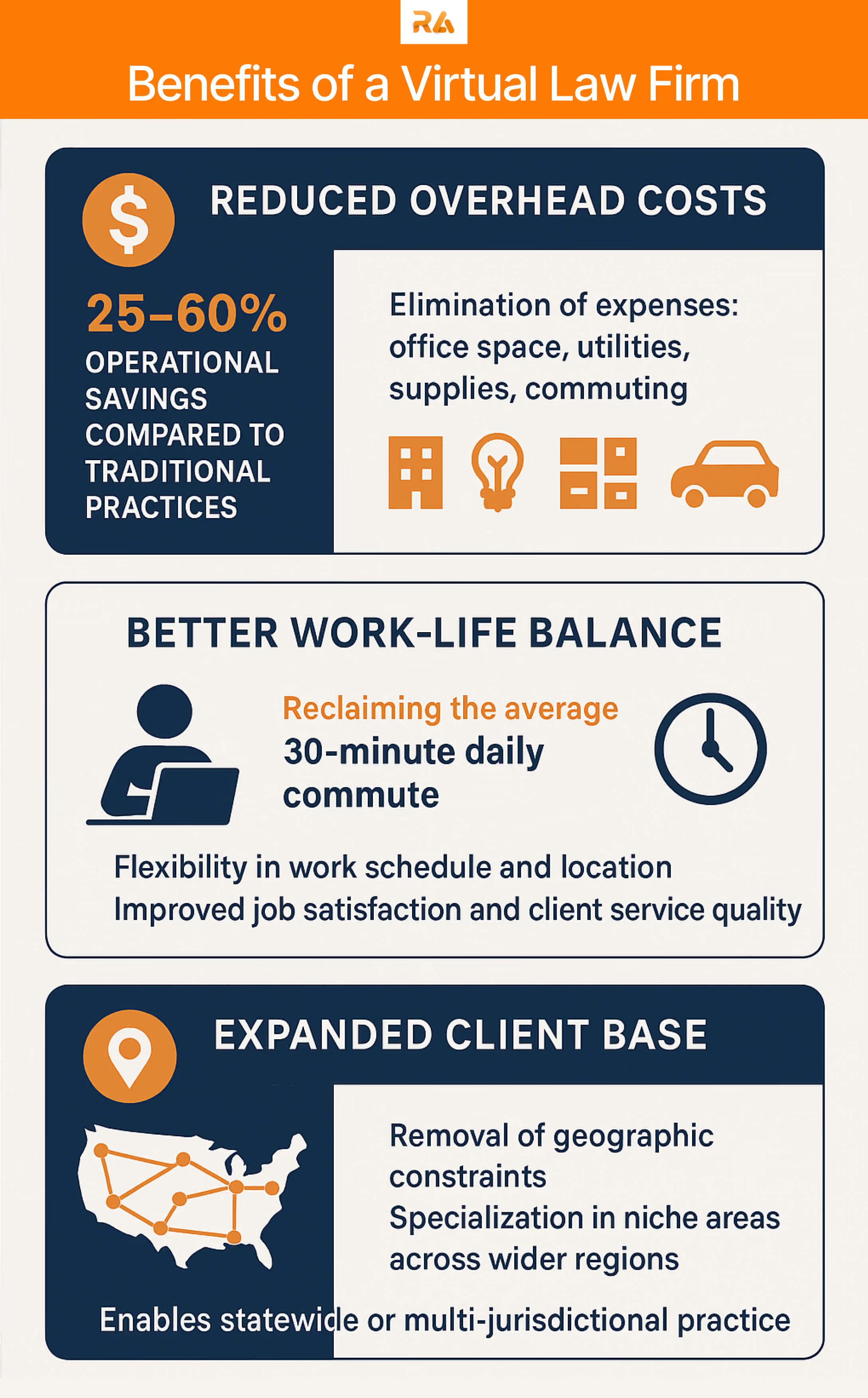If you've ever dreamed of starting your own law firm without the overhead of a physical office, now’s the time. With the right tools, strategy, and support, you can run a successful legal practice entirely online.
Since the COVID-19 pandemic, remote work setups have continued to grow and have been adopted around the world. Nowadays, many traditional business operations are either digitized or outsourced. Law firms are following this trend and discovering the benefits for both clients and attorneys. However, whether physical or remote, challenges will always exist, no matter which setup you choose.
Whether you're looking to transition your existing practice or start fresh with a virtual setup, this guide will walk you through everything you need to know about building a successful virtual law firm.
What is a Virtual Law Firm
A virtual law firm is a legal practice that operates primarily online without a traditional brick-and-mortar office. Attorneys and staff still perform regular legal tasks, such as providing legal services, meeting with clients, and managing cases, but everything happens remotely through digital tools and platforms.
Virtual law firms can take many forms, from solo practitioners working from home to multi-attorney practices with team members distributed across different locations.
How to Create a Virtual Law Firm Business Plan: 6 Expert Tips
Plan and Assess Your Needs
Starting any business begins with careful planning. Make sure you understand the costs involved, such as the initial investment in tech infrastructure, software, and monthly operating expenses, including licensing fees, subscriptions, and marketing. Most virtual firms require less startup capital than traditional offices, but you still need enough to cover the essentials.
Creating a simple business plan can help keep you focused. Plan your transition carefully, develop a solid pricing strategy, and take time to create financial projections. This will ensure you have adequate capital to launch and sustain your virtual practice through its early growth stages.
Choose a Practice You’re Expert In
Going virtual doesn’t change the fundamentals of law—you still need strong expertise. Stick to a practice area you’re confident in—one where you have experience and deep knowledge. This foundation builds the credibility and trust that clients look for.
By focusing on specific practice areas where you have expertise, you can:
- Position yourself as an authority in your field
- Target marketing efforts effectively
- Streamline your technology needs and workflows
- Command premium rates for specialized knowledge
Consider practice areas well-suited for virtual delivery, such as estate planning, intellectual property, business formation, contract drafting, or specific aspects of family law.
Create a secure client portal
According to the American Bar Association’s Journal, a virtual law firm must have a secure client portal accessible from its website. Think of it as the digital version of your reception area and meeting room—where clients can access documents, get updates, and communicate with your firm.
When choosing a client portal, look for features like:
- Secure document sharing and storage
- E-signature capabilities
- Case status updates
- Chat or messaging tools
- Payment processing
- Intake forms and questionnaires
- Two-factor authentication
A client portal improves client satisfaction by offering 24/7 access to information about their legal matters. Prioritize tools with strong encryption, access controls, and authentication to protect sensitive client data.
Use the Right Virtual Law Office Software
Your virtual law firm runs on software, so choosing the right tools will make your day-to-day operations easier. The software you choose will form the backbone of your virtual practice. Invest in reliable, secure, and user-friendly solutions designed specifically for legal professionals.
Here are few essentials:
Practice Management Software:
- Clio Manage: All-in-one practice management with billing, client portal, and document management
- MyCase: User-friendly interface with built-in client communication tools
- PracticePanther: Automation-focused platform with customizable workflows
Document Management:
- NetDocuments: Cloud-based document management with advanced security
- Worldox Cloud: Comprehensive document organization and storage solution
- iManage: AI-powered document and email management
Time and Billing:
- TimeSolv: Time tracking and invoicing
- Bill4Time: Easy time capture with flexible billing options
- Rocket Matter: Intuitive time tracking integrated with project management
Video Conferencing:
- Zoom: Feature-rich video meetings with waiting rooms and breakout sessions
- Microsoft Teams: Integrated with Microsoft 365 suite for document sharing
- GoToMeeting: Reliable option with strong security features
The right combination of software will depend on your specific practice needs, but prioritize solutions that integrate well with each other to avoid data silos or inefficient workflows.
Establish clear communication channels
Without the organic interactions that happen in physical offices, secure communications are critical in virtual setup. Set clear protocols for both clients and your team to avoid confusion.
Client Communications:
- Set expectations about response times (same day, 24 hours, 48 hours)
- Offer multiple contact options (portal messages, email, phone, video)
- Schedule regular check-ins for ongoing matters
- Document all substantive communications
Internal Team Communications:
- Implement daily or weekly check-ins via call or video
- Use project management tools to track case progress
- Create digital spaces for virtual social interaction of staff
- Establish clear availability hours and response expectations
Having clear boundaries helps avoid confusion and improves your client experience. You can also use tools like Calendly for scheduling and Google Workspace or Microsoft Teams for team collaboration if you’re working with others.
Leverage Virtual Legal Staff
One of the biggest perks of going virtual is the ability to hire legal professionals from anywhere. Instead of building a full in-house team, you can work with remote paralegals, legal assistants, and even other attorneys on demand.
Platforms like Remote Attorneys let you hire from a network of thousands of vetted attorneys and paralegals with experience in remote work for different practice areas. They offer month to month contracts, so you can easily scale your team based on your current caseload.

Benefits of a Virtual Law Firm
Reduced Overhead Costs
When you operate virtually, you can cut expenses that traditionally eat into law firm profits. Instead of paying for office space, utilities, supplies, and commuting, you can redirect those funds toward growing your practice.
Many virtual attorneys report saving 25-60% on operational expenses compared to traditional practices, allowing you to offer more competitive rates and allocate resources for tech investment.
Better Work-Life Balance
Virtual practice gives you control over when and where you work. You can structure your schedule around your peak productivity hours rather than traditional office expectations.
According to Statista’s 2024 Transportation and Logistics Report, the average daily commute to work for Americans is half an hour or less. With remote work, you can reclaim that time for family, fitness, learning, or rest, which leads to better job satisfaction and higher-quality client service.
Expanded Client Base
A virtual practice removes the geographic constraints on client acquisition. You're no longer restricted to serving clients who can conveniently visit a physical office. This broader reach allows you to build specialized practices that might not be sustainable in smaller local markets.
For example, you could become the go-to attorney for a specific industry niche on a statewide or even national level, rather than handling a wide range of legal matters for local clients. Many virtual attorneys find they can serve clients across their entire state or in multiple jurisdictions where they're licensed.
Increased Efficiency
Digital workflows eliminate many time-consuming aspects of traditional legal practice. Automation tools can handle routine tasks like appointment scheduling, document generation, and follow-up communications.
Cloud-based practice management systems give you instant access to all case information without searching through physical files. These platforms also reduce human error by standardizing processes across all matters.
Many virtual attorneys report saving hours weekly through these efficiencies and gain more focus to spend time on billable work.

Things to Consider Before Going Virtual
Location and Licensing
Even virtual firms must comply with jurisdictional rules. Make sure you're licensed in every state where your clients are located to avoid violations related to the unauthorized practice of law. Additionally, most virtual firms still need a registered business address for mail and service of process.
Technology
Your practice depends entirely on technology. Invest in business-grade internet with backup options to prevent disruptions. Use cloud services with offline modes for critical applications. Create straightforward contingency plans for technology outages, including backup communication methods for emergencies. Lastly, stay up to date with the latest versions of all tools and software you rely on.
Ethics and Privacy
Know your ethical obligations when it comes to advertising, billing, and client confidentiality in a digital environment. Remote practice introduces specific ethical considerations. Stay current on ethics opinions in your jurisdiction and implement thorough conflict checking systems across all platforms.
Use secure, encrypted channels rather than standard email for confidential information. Maintain separate devices or accounts for professional matters, and document all client interactions in your practice management system.
Cybersecurity
You're handling highly sensitive data. Implement strong password policies, multi-factor authentication, and regular data backups. Train your team to recognize security threats and secure their home networks. Make it a best practice to update all software regularly to address known vulnerabilities.
Final Thoughts: Opening A Virtual Law Firm

Launching a virtual law firm represents an exciting opportunity and new responsibility. This flexible model allows you to practice law on your own terms while making legal services more accessible to clients.
However, success requires more than just working online, it demands careful planning, legal skill, and an entrepreneurial mindset. As technology serves as the heart of your operation, it should enhance—not replace—the personal relationship between attorney and client. A successful virtual firm balances innovation with the human touch.
Ready to go digital? We're here to help you start planning your virtual law firm today—and shape the future of your legal practice.
Disclaimer: This article is for informational purposes only and does not constitute legal advice. Always consult with qualified legal counsel regarding specific questions or concerns about launching or operating a virtual law practice in your jurisdiction.



.webp)
.webp)